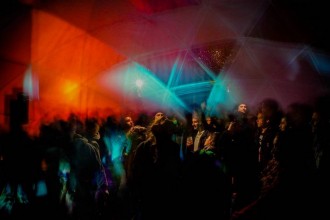Caramel (Sekkar Banat), the mouth-watering title chosen by Lebanese director Nadine Labaki for her first film released in 2007, not only conjures up the raving beauty of the women on screen but is also the symbol of what links them altogether, the beauty salon where their regular meetings are hosted.
Scene after scene, we are invited to share the everyday life of six women whose age, religion and backgrounds are different and account for the diversity of situations an Arab woman can go through in her life depending on the social category she belongs to.
We can’t help but get attached to the six friends who regularly meet in the bittersweet microcosm of Arab society, the beauty salon named » Si belle » nested in old Beirut.
The genuine social panorama captured by Nadine Labaki’s finesse and delicacy results from the puzzle of several portraits. These characters are: Nisrine, a Muslim woman who loses her virginity and undergoes hymen reconstruction surgery in order to get married; Rima, a lesbian hairdresser who is still discovering her sexual orientations; Jamale, a middle-aged woman who finds difficulty coping with her menopause; Lili, an old lady who makes Rose’s life tough; and finally, the beautiful Layale who owns the salon and is romantically involved with a married man.
All the characters swirl around Layale’s figure, sublimely played on screen by the director herself. These numerous feminine characters allow her to complete, stroke by stroke, the painting of a Lebanese society torn between tradition and modernity as she engages with burning social issues such as adultery, homosexuality, virginity,and prostitution.
Immersed in the depths of Arab society, we find out that a unmarried couples cannot converse in a car without arousing the police’s suspicion. We also discover that it is paradoxically easier for a prostitute to book a hotel room than it is for two lovers.
Some would argue that this » Arab version of Sex & the City » is too lightweight. However, this is precisely what makes the film so delightful. As the title indicates, it is caramelized with joy of life and softness but also tackles taboos and helps us explore Arab society from a woman’s point of view. These women endure the supremacy of appearance over education and intellectual stimulation since their everyday lives revolve around the quest to find a husband or a caramel epilation. Even a funeral becomes an occasion for them to exist as the very first client of the institute admits it.
Fluctuating between gravity and comedy, Nadine Labaki’s second film, Where do we go now?,is another occasion for her to tackle serious issues in an entertaining way. The action takes place in a mysterious village where Christians and Muslims have the same occupations, go to the same coffee shop, and suffer from the same pain triggered by war. A confessional war whose incandescent flame can be relit at the slightest touch and become a threat to their peaceful existence. Lulled by the film’s melodious sound track, we never learn the exact location of the village. But we understand that the director intended for the peaceful message to be universal.
To avoid the throes of this dreadful war, the women fashion original strategies involving hashish and even stranded Ukrainian dancers to distract the men. These zany ideas bring humor into the film whose dominating colors are dark from its very outset, adding a touch of freshness that definitely characterizes Nadine Labaki’s cinema.







